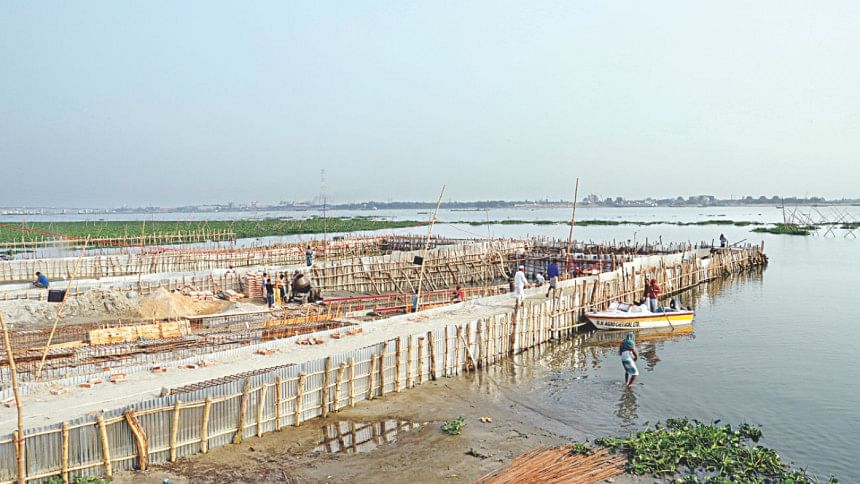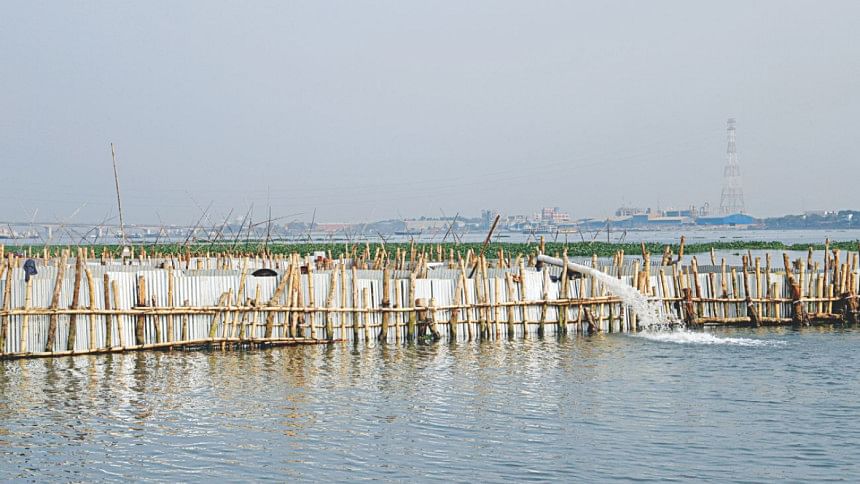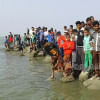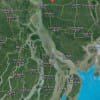Meghna too not spared

Nothing seems to scare away the river grabbers.
Amid impassioned calls from the judiciary, environmentalists and the media to save the country's last surviving rivers, a private company is building two slipways in the Meghna river in Munshiganj.
The firm, Khan Brothers Slipway and Engineering Works, has neither the permission nor the environment clearance from the authorities for the project, government and company officials have confirmed.
Even so, the firm has put up a makeshift enclosure in the Meghna, well below its dry season low watermark, on its west bank at Char Betagi in Gazaria upazila to set up the two slipways, each 600 feet long and 15 feet wide.

On January 26, company workers were seen pumping out water from the enclosed area and preparing to build the concrete structures.
Over the last one year, the company filled a large expanse of the river foreshore for the dockyard. It then started building the slipways, but Bangladesh Inland Water Transport Authority (BIWTA), the custodian of rivers, did not stop it, locals said.
Char Betagi is a low-lying shoal near another shoal called Char Balaki, both surrounded by the Meghna at the confluence where Shitalakkhya and Dhaleshwari falls into the Meghna.
Tofayel Kabir Khan, managing director of Khan Brothers Group, first denied grabbing any river land, and claimed they bought 40 acres of shoal land at Char Betagi from locals.
But when pressed, he said they encroached on an area of 4,500 square feet, which is 150 feet into the river, with “verbal consent” from the BIWTA.
“We also obtained a licence from the BIWTA for using two more acres of the river foreshore,” he claimed.
He, however, admitted they did not have the environmental clearance and the shipping department's permission to set up the slipways.
Shafiqul Haq, BIWTA director for port and transport, said they had indeed issued a licence to Khan Brothers for using the Meghna foreshore, but it was cancelled a few years ago for violating the terms and conditions.
He said he had no knowledge if the firm obtained a fresh licence.
“In any case, it is absolutely illegal to carry out development work on river foreshores, let alone occupying the flowing river, without permission,” he said, adding that they would look into how the company did so.
Foreshore of a river is the sub-soil lying between the lowest watermark during normal dry season tide and the highest watermark during normal monsoon tide, as defined in the Port Rules 1966.
In a letter to the Narayanganj River Port authorities, the BIWTA said on January 23 they had decided to allow Khan Brothers to use 138 decimal of foreshore land, way less than what the company claims.
The letter asked the joint director of the Port to sign an agreement with Khan Brothers and issue a temporary permission for using the foreshore.
But the company started building the dockyard before obtaining the licence, environmental clearance and shipping department's permission.
“We have not issued any licence to Khan Brothers for using the foreshore, and whatever the company is doing on the foreshore and in the river is illegal,” said Gulzar Ali, joint director at the Narayanganj River Port.
Also, the company is building the dockyard without involving BIWTA engineers, which is mandatory, he added.
Asked how all these happened under the very nose of the port authorities led by him, Gulzar said, “We monitor the river within the port area every month, but I don't know how it happened. We are going to serve a notice on them soon.”
Officials say the BIWTA does not carry out regular drives to monitor if lessees are violating the terms and conditions. In some cases, the authorities simply turn a blind eye, allowing the grabbers to do whatever they please.
It is common among grabbers to manage documents of ownership of shoal land. Later, they gradually fill up the river, altering the river course and the character of the foreshore, they added.
Only last week, the High Court declared rivers a living entity and a “legal person,” meaning no rivers can be harmed.
The construction of the dockyard comes amid an eviction drive to free rivers from the clutch of grabbers. Over the last one week, the BIWTA knocked down hundreds of illegal structures set up on the banks of the Buriganga and Karnaphuli.
Exact data is not available, but environmentalists and journalists working on the issue say most of the around 450 rivers in the country face serious threats because of ruthless grabbing and pollution. The Buriganga, Dhaleshwari, Turag, Balu, Shitalakkhya and Karnaphuli are among the worst affected.
To save the rivers, the HC said last week, the state must act as the “trustee” of all rivers, hills, sea beaches, forests, canals and beels and other waterbodies while the National River Protection Commission will remain bound to protect them.

 For all latest news, follow The Daily Star's Google News channel.
For all latest news, follow The Daily Star's Google News channel. 







Comments